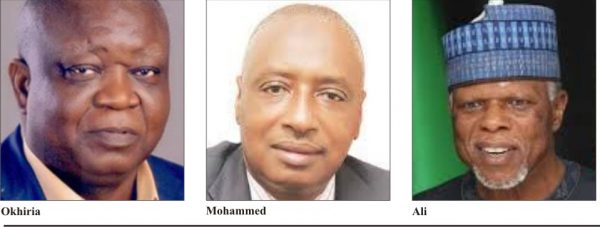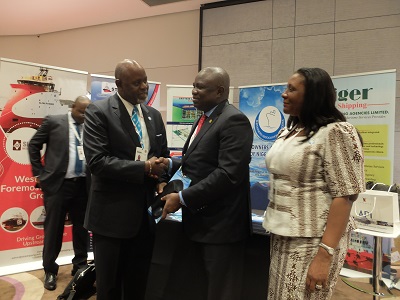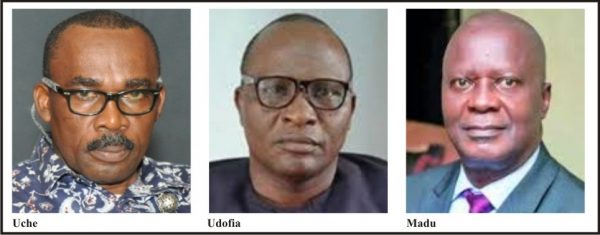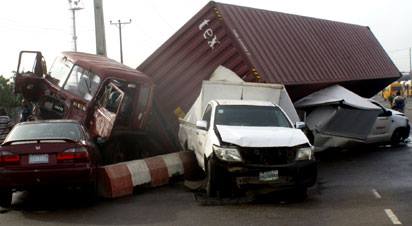2019 Transport Agencies Rating: How NRC, Customs NIWA, NCAT & NITT Fared

By Kenneth Jukpor & Okuneye Moyosola
MMS Plus presents the scorecard of transport sector agencies based on their performance in the first half of 2018 with regards to their core functions. In this week’s appraisal, we x-ray; Nigeria Customs Service (NCS), Nigerian Railway Corporation (NRC), National Inland Waterways Authority (NIWA), Nigerian institute of Transport Technology (NITT), among others.
For the grading system: A =90-100%, B+ = 80-89%, B =70-79%, C+ =60-69%, C =50-59%, D =40-49% and E = 30-39%, F = 0-30%. Enjoy it:
Nigeria Railway Corporation (NRC)
NRC is one institution that has enjoyed attention and support from the Federal Government under the President Mohammadu Buhari leadership. With 2019 in review, NRC will be assessed based on five of its statutory functions with twenty (20) marks for each.
Manage and operate the railway for carriage of passengers and goods:
The NRC management intensified efforts to ensuring improvement and efficiency in services to the freight owners and the teeming commuting public. However, the biggest gain for NRC in 2019 which was e-ticketing for trains took place in the last week of December. The Managing Director, NRC, Engr. Fidet Okhiria said the e-ticketing platform would not only guarantee orderliness in purchasing of tickets but also address some security challenges.
NRC recorded successes in freight patronage but the challenges in service delivery on both freight and passengers trains persisted. Although, the railway is seen as a viable avenue to decongest Lagos ports in the face of the ongoing road construction that has caused serious gridlock with Lagos district commencing a shuttle service between Apapa and Alago Meji but there had been various reports on poor welfare to customers and low quality service delivery.
With the Lagos-Ibadan railway and other rail projects expected to be concluded in 2020 and an improvement in perception and patronage of the rail mode, NRC would see a more productive year in 2020.
Based on this NRC scores 10/20
Meet cost of operation; improve market share and quality of services;
The NRC still finds it difficult to generate enough revenue to meet its cost of operation as a chunk of its finances come from the Federal Government to pays workers salaries and other related expenses. However, there was increase in the ticket fares which the Director, Operations, Mr. Niyi Alli justified the decision by arguing that the quality of services enjoyed by passengers at the station is commeasurable with the fare. According to him, the Abuja-Kaduna train is of qualitative services coupled with other customers’ service innovations.
NRC would have to up the ante in service delivery especially after receiving the trains and locomotives commissioned by the President, President Muhammadu Buhari at the Abuja-Kaduna station to meet up with demands at the stations.
Score = 8/20
Direct and control of any expansion or extension of the railway and the construction of new railway:
The non-completion syndrome plaguing the railway revamping project clearly underscores shoddiness in government’s involvement in development projects in the country. Since the much publicized Abuja-Kaduna standard gauge rail line came on stream in July 2016 with much fanfare, government has been celebrating only that achievement. In 2019, there were no significant improvement or expansion of the railway construction and this left the Minister of Transport, Hon. Rotimi Amaechi terribly bitter.
However, while interacting with journalists in Lagos recently, after an inspection of the ongoing work on the Lagos axis of the Lagos-Ibadan rail line, Amaechi stated that there is remarkable improvement on the pace of work on the Lagos-Ibadan standard gauge railway line. Media reports state that the construction work is ongoing at the 10 stations along the 156-kilometre rail line corridor which included Ebute-Matta, Agege, Agbado, Kajola, Papalanto, Abeokuta, Olodo, Omi Adio and Moniya stations.
It is sad that the Nigerian government gave out these massive rail contracts to foreigners without provision for knowledge/ technology transfer.
Score = 4/20
Ensure safety of operations and maximum efficiency;
There were no major reports of train derailments but accidents involving individuals walking around the rail tracks were recorded with loss of lives. Reports of robbery, theft and other security breaches weren’t heard.
The NRC Managing Director also asserted that the e-ticketing would ensure the data base of all passengers boarding the train was captured in case of emergencies.
Score = 12/20
Meet social responsibility in a manner that will meet the requirements of rail users, trade, commerce, industry and general public:
In terms of social responsibility, NRC doesn’t meet the requirements of rail users, trade, commerce, and others. This has been blamed on capacity constraints and neglect by past governments and existing railway act which is preventing the input of private investors.
Delays and non-adherence to time schedules without explanations are still obvious qualities of Nigerian railway services. It is incontrovertible that the DMU which is the standard coach and locomotive is still not affordable to the common man.
Nothing tangible was recorded in the area of corporate social responsibilities.
Score = 2/20
Conclusion
Finance experts state that the Chinese companies handling the railways were stuck as a result of the heightened disagreement in balance of trade between the United Staes of America (USA) and China. This factor is reportedly responsible for the failure to meet the completion date for rail projects that ought to have been finalized at the end of 2019. Nevertheless, the railway transport system is still popular because of consistency in activities in the sector.
Nigerian railway system is expected to complete its phases of rehabilitation in order to play an increasingly pivotal role in the economic and social developments of the country in 2020.
Total Score=36/100
Grade E (36%)
Nigeria Customs Service (NCS)
Nigeria Customs Service is one of the most prioritized government institutions when it comes to the issue of revenue generation but it also has the crucial role to facilitate trade, among other duties. For this rating, we would score the agency based on its performance of four (4) statutory functions:
• Collection of Revenue (Import /Excise Duties & other Taxes /Levies) and Accounting for Same:
NCS set a new record for revenue generated in a single year with the sum of N1.341 trillion as revenue for the 2019 fiscal period. The amount generated was more than the N969.8 billion revenue target set for the year 2019 and N139 billion higher than the sum of N1.2 trillion collected in 2018.
The Comptroller-General of Customs, Col. Hameed Ali (Rtd.) described the revenue collected as a “result of resolute pursuit of what is right rather than being populist by compromising national interest on the altar of individual or group interests”.
Score = 24/25
• Anti-Smuggling Activities:
In 2019 NCS recorded massive seizures with 30,906 various contraband items with a duty paid value of N62 billion were also seized during the period under review.
New strategies were successfully adopted to combat the menace of smuggling, however, the increased cases of smuggling and Customs interception of goods already exited from ports indicate that the Service has to do more to sanitize its system and sufficiently punish compromised officers.
Score = 15/25
• Trade Facilitation/ Engaging in Research, Planning and Enforcement of Fiscal Policies of Government:
Trade cannot be said to be properly facilitated within the period under review mainly as a result of the absence of scanners which led to the burden of physical examination. The status quo remains the same in terms of operations throughout 2019.
Nothing of note has been reported in terms of Research and Planning.
Score= 5/25
• Working In Collaboration With Other Government Agencies In All Approved Ports and Border Stations:
Customs made efforts to improve its inter-agency collaboration with sister agencies such as the Nigeria Police Force (NPF), Standards Organization of Nigeria (SON), Nigeria Drug Law Enforcement Agency (NDLEA), National Agency for Food and Drug Administration and Control (NAFDAC), Economic and Financial Crimes Commission EFCC, the Nigerian Army in ensuring compliance, anti-smuggling and other forms of crime combats which includes illegal commercial activities and illicit trade.
However, the unhealthy rivalry between Customs and an agency like NPA is an issue that has robbed the maritime community of the enormous potentials of a Single Window platform. Both agencies claim to have their respective Single Windows.
Score= 10/25
Conclusion:
The performance of the Customs in 2018 was impressive, especially in the aspect of revenue collection and the recent anti-smuggling vendetta of the agency since the last quarter of 2018 has been commendable. Customs gets 50% based on the recent upturn in its activities. However, the burden of scanners remains a major challenge and Customs management should address this issue expediently because of the security implications to the country as well as the time lost in the process of physical examination.
Total Score = 55/100
Grade = C (55%)
National Inland Waterways Authority (NIWA)
The law establishing NIWA gave it the following statutory roles: – Provide regulation for inland water navigation; – Ensure development of infrastructural facilities for a national inland waterways connectivity with economic centers using the River Ports and nodal points for inter-nodal exchanges; –Ensure the development of indigenous technical and managerial skills to meet the challenges of modern inland waterways transportation. For the purpose of this report each of the core function carries 25points while the other functions carry another 25 points.
Provide regulation for inland water navigation:
In 2019, NIWA continued its annual trend of reshuffling its Managing Director as the former one, Senator Olorunnimbe Mamora was replaced by Chief Kingsley Moghalu. Mamora had developed a blueprint for the regulatory framework for inland water navigation in the country, but his stay was short-lived as he was appointed Minister of State for Health.
The existing inland waterways regulation has been ineffective as several ills thrive on the inland waterways while numerous cases of boat capsizes were recorded in 2019
Score = 5/25
– Ensure development of infrastructural facilities for national inland waterways connectivity with economic centers using the River Ports and nodal points for inter-nodal exchanges;
Despite the flag-off of Baro port equipped with a Mobile Harbour Crane, Transit shed, Administrative block, fire hydrant system, water treatment plant, Reach stacker, 100KVA power generating set, and three numbers forklifts of various tonnages in 2018. In 2019, the port wasn’t utilized as a result of numerous challenges.
NIWA also failed to achieve its well publicized 2019 plans to build a modern bonded terminal at Oyingbo Jetty, Lagos from where containers can be moved from Apapa and Tin can Ports on badges and transported by either rail or road to destinations, the agency made no significant improvement in this aspect in 2019.
There were also talks about plans to transform the agency’s Lagos office at Marina into an ultra-modern superstructure as a terminal where sea going vessels can berth and off-load cargoes.
Score = 8/25
Ensure the development of indigenous technical and managerial skills to meet the challenges of modern inland waterways transportation:
The Authority has held several summits with indigenous operators but most of the meetings have been to sensitize the operators on the requisite standards and reemphasis the need to adhere to safety regulations. Not much strategic efforts have been recorded with regards to training in this aspect.
Score = 8/25
Other functions and powers of the Authority include: – undertake capital and maintenance dredging;
– undertake hydrological and hydrographic surveys:– design ferry routes: – survey, remove, and receive derelicts, wrecks and other obstructions from in land waterways; – operate ferry services within the inland waterways system; – undertake installation and maintenance of lights, buoys and all navigational aids along water channels and banks; etc.
NIWA was only able to attack some of these responsibilities.
Score = 5/25
Conclusion:
After settling in as the Managing Director of NIWA, Senator Mamora and developing a guide to unfold an inland waterways transportation master-plan capable of providing the platform for the much anticipated multi-modal transportation system in Nigeria, Mamora was removed and replaced with Moughalu who is still getting to acclimatize with the agency and the sector.
In 2019, NIWA also witnessed the retirement of the General Manger, Lagos Area Office, Engr. Muazu Sambo. These changes rocked the agency even as the electioneering and poise of Mamora also contributed to the poor achievements in the calendar year. Expect success stories from the more stabilized agency in 2020.
Total Score=37/100
Grade: F (26%)
Nigerian institute of Transport Technology
Nigerian Institute of Transport Technology (NITT) is charged with the responsibility of providing professional training for middle cadre managers on the areas of transport and logistics and also conducts research and offer consultancy services to both public and private transport and logistics organizations.
The institute’s functions are as follows and each function will be given 20 points.
Serve as a Transport Intelligence Centre for monitoring transport and logistics systems
During the time under review, the agency did not record any activity in this area. Although the institute established an Intelligence Transport System (ITS) unit in Vienna, Austria to trace the movement of stolen vehicles from Nigeria in 2016.
Score = 4/20
Provide equipment and facilities for the encouragement, promotion and conduct of applied research in all modes of transport.
There was no tangible information in this regard in the first half of 2019.
Score= 4/20
Provision of courses and training programs for senior and middle cadre managers, technicians and technologies suited for employment in all modes of transport.
NITT flagged off the N-Power build training programme on Auto Mobile at its Transport Technology Centre (TTC), Zaria in the year 2019.
The N-power Build as a government intervention programme is an accelerated training and certification programme that is aimed at engaging and training 75,000 young unemployed Nigerians in order to build a new crop of skilled and highly competent work force of technicians, artisans and service professionals.
NITT, during the year also trained 116 drivers from Standards Organization of Nigeria (SON) on the rudiments of defensive driving and safety techniques. The training was informed by the growing need to equip the drivers with requisite modern skills and competencies for efficient and effective transport and logistics operations.
Score= 7/20
Provision of courses of instruction leading to the award of Advanced Certificate in Transport Studies (ACTS) and Post Graduate Diploma in Transport (PDG) with three distinct specialized areas: Transport Management, Transport Planning and Transport Technology;
Score=4/20
Carrying out research and consultant services to both government and private organizations in Nigeria and West African sub-region; and Publication of research activities through journals and other media
No research by the institute was conducted from our investigation.
Score= 5/20
Conclusion
NITT is an agency saddled with the arduous task of professionalizing all cadres of players in the nations transport sector. There is no indication that the agency is working towards achieving this feat. Minister of Transportation, Rotimi Amaechi towards the end of the year said that the Nigerian Institute of Transport Technology has all it takes to design Made-in-Nigeria vehicles car. However, this statement by the minister would only be a reality if the institute starts creating innovative ideas and exploring technology.
Total score=24/100
Grade F (24%)
Nigerian College of Aviation Technology (NCAT)
Nigerian College of Aviation Technology (NCAT) is responsible for performing training on Aviation personnel. The College boasts of more than 50 years of experience in providing human resource development in the aviation industry in Africa and is well on its way to becoming a reputable global provider of aviation training. NCAT undertakes training programmes to meet both national and international requirements. Training is also provided in non-aviation specific areas such as computer equipment maintenance and satellite communication principles. The college’s aviation training programmes are also in conformity with ICAO standards and recommended practices.
With the view to improving academic knowledge of professionals in the sector, NCAT, in the year under review commenced courses leading to the award of Ordinary National Diploma (OND), Higher National Diploma (HND) and Post Graduate Diploma into various fields of academy. For OND, the college was running courses on Electrical/Electronics Engineering Technology, Aircraft Maintenance Engineering Technology, while for HND, admissions were available for Aviation Management, Aircraft Maintenance Engineering Technology (Avionics option) and Aircraft Maintenance Engineering Technology (Airframe/Power Plant Option).
In response to emerging needs in the air travel sector, NCAT also took fresh steps to boost capacity and training infrastructure within the country. NCAT also commenced a catch-them-young initiative, reaching out to potential pilots and engineers in secondary schools.
The Nigerian College of Aviation Technology (NCAT) also disclosed plans to increase its modern training aircraft to 14 this year. However, there was no information provided on the actual acquisition of the aircraft.
Over the years, NCAT has been sending its firemen to Cameroon for training. However, this year was an exception as an automatic fire simulator was installed at to provide training for fire officers, which was hitherto done in Cameroun and other countries. This development shows that the college is safe and conducive for learning for foreign and local students.
Having objectively looked into the performance of the roles expected of NCAT, the institution is scored: 40/100
Conclusion
NCAT made modest improvements in the year 2019; however, a lot is still expected from them as they play a crucial role in the aviation industry.
Grade D (40%)
Expect the last batch of ratings of transport agencies next week!








